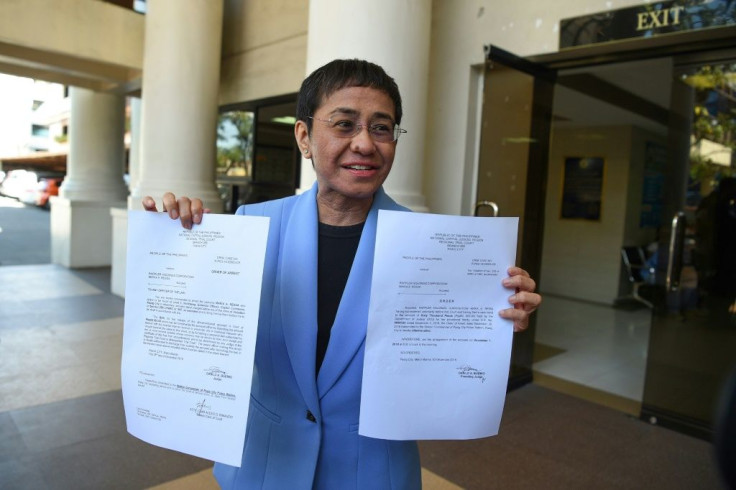Maria Ressa Verdict: Journalist Found Guilty Of 'Cyber Libel', Could Face 6 Years In Prison
KEY POINTS
- Journalist Maria Ressa, a long-time Duterte critic, is convicted of cyberlibel in a case with dubious legal grounds
- Ressa faces up to six years in prison
- She also faces seven other lawsuits aimed at shutting down her news website, Rappler
A Manila trial court Monday convicted Maria Ressa, CEO and executive editor of Filipino online news website Rappler, and former Rappler researcher-writer Reynaldo Santos, of "cyber libel" charges based on contentious legal grounds.
Rappler is known for its scathing investigative pieces on misdeeds of the administration of President Rodrigo Duterte and his allies. Ressa herself is an outspoken critic of Duterte. Her arrest was seen by the world journalism community as a brazen attempt to silence a Duterte political foe.
Ressa also faces seven other charges, which have the potential to shut down Rappler Inc., the company that owns the Rappler website. Among these cases are tax evasion charges related to Rappler's ownership pending before the Court of Tax Appeals and the Pasig Regional Trial Court.
Judge Rainelda Estacio-Montesa of the Manila Regional Trial Court (RTC) Branch 46 ordered Ressa and Santos to pay P200,000 in moral damages and another P200,000 in exemplary damages. Once the conviction becomes final, they will each have to pay P400,000 in damages.
The court sentenced Ressa and Santos to a minimum six months and 1 day to a maximum of six years in jail. On the other hand, Ressa and Santos won't have to go to jail for now since the conviction is appealable all the way to the Philippine Supreme Court.
Estacio-Montesa allowed bail under the same bond. She did, however, find Rappler as a company to have no liability in the case.
A TIME magazine Person of the Year and a former bureau chief for CNN, Ressa said the guilty verdict was "not unexpected."
"We will keep fighting," she said. "I appeal to you, the journalists in this room, the Filipinos who are listening, to protect your rights. We are meant to be a cautionary tale. We are meant to make you afraid. But don't be afraid. Because if you don't use your rights, you will lose them."
Ressa and Santos were sued by businessman Wilfredo Keng, a Filipino-Chinese, in October 2017 after Rappler published a story in 2012 about Keng's alleged lending of his car to a deceased former Chief Justice of the Supreme Court. Keng originally demanded P50 million in damages from Rappler.

Ressa appeared before the Philippines' National Bureau of Investigation (NBI) in January 2018 to comply with the online libel complaint subpoena. On Feb. 13, 2019, Estacio-Montesa issued an arrest warrant for cyber libel against Ressa.
It's been noted the cyber libel law came into effect in 2014, or two years after Rappler originally published the story. Keng also sued in 2017, or five years after the story was published. This lapse is beyond the one-year prescription period for libel under the Revised Penal Code.
Prosecutors made the claim a correction made to the story after the law passed constituted a "republication." This means the story could be considered cyber libel.
Keng disputed parts of the Rappler story quoting an intelligence report linking him to drugs and human trafficking. The RTC said Rappler did not verify the information about Keng and didn't publish his side of the story.
Ressa's trial on charges of cyber libel began in July 2019. During the first day of her trial Ressa said, "This case of cyber libel stretches the rule of law until it breaks."
Cyber libel is to be found in the Cybercrime Prevention Act of 2012 (Republic Act No. 10175). Approved Sept. 12, 2012, the law aims to address legal issues such as cybercrime offenses. These offenses include cyber libel, cyber squatting, cyber sex, child pornography, identity theft and illegal access to data.
The law, however, has been criticized for its provision on criminalizing libel, which is meant to suppress freedom of expression. The Supreme Court upheld most of the sections of the law, including the controversial cyber libel component, on Feb. 18, 2014.
© Copyright IBTimes 2024. All rights reserved.





















